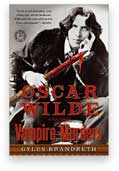Oscar Wilde and the Vampire Murders review
 Just saying Oscar Wilde and the Vampire Murders is so delicious it feels like you’re tossing off one of Wilde’s bon mots. It’s such a wonderful notion that author Gyles Brandreth has created in a book filled so thick with witticisms you can cut ’em with a knife. And with a cast that includes Wilde, Arthur Conan Doyle, Bram Stoker and the Prince of Wales, how can you go wrong?
Just saying Oscar Wilde and the Vampire Murders is so delicious it feels like you’re tossing off one of Wilde’s bon mots. It’s such a wonderful notion that author Gyles Brandreth has created in a book filled so thick with witticisms you can cut ’em with a knife. And with a cast that includes Wilde, Arthur Conan Doyle, Bram Stoker and the Prince of Wales, how can you go wrong?
Admittedly it’s not a weighty book. I would go so far as to call this a mere bagatelle or at best an homage to the epistolary style of Stoker’s own Dracula, but it is nevertheless enjoyable — except for the denouement, which leaves one feeling a little disappointed, after a pretty entertaining summation by Wilde. My only peeve is Brandreth casting Doyle in that bumbling Watson role to Wilde’s turn as Sherlock Holmes. I especially don’t appreciate making it seem like Doyle got the idea for the Man With the Twisted Lip from the events of this story. It feels like Brandeth is taking credit for Doyle’s imagination, rather than the other way round.
But apart from this complaint, I can only praise this story where Wilde and Doyle are asked by the Prince of Wales to investigate the strange death of the Duchess of Albemarle, found in the beginning of the story naked and mutilated and with two puncture wounds about her neck. Possible suspects include Rex LaSalle, a self-confessed vampire who in his memoirs claims an intimate relationship with Wilde, and the Prince of Wales own son, Prince Albert, whom many had earlier suspected of being Jack the Ripper. And there’s also Lord Yarborough, a doctor who like Doyle finds a particular fascination with that familiar medical complaint of Victorian women — hysteria. And seeing that we’re talking Wilde, we’ve got to look in on Lily Langtree and a quick trip to France to investigate the second death of a can can dancer. Throw in a mind reader, hypnotism, the Vampire Club and an insane asylum and you’ve got a pretty savory stew.
And all of this is written as journal entries, telegrams and letters written by Doyle, Stoker, Wilde and Robert Sherard, Wilde’s biographer and friend. The format also gives charming glimpses into the relationships these men have with their admittedly marginalized wives. Of course it also discloses Doyle’s cluelessness as to his friend’s predilections.
My only other criticism of the book is that the delicious sounding “vampire murders” of the title isn’t really necessary to the story. You could remove almost any mention of vampires — creating some sort of Hellfire Club to replace the Vampire Club — and still have an entertaining story. But then you wouldn’t have the enjoyable book cover with Wilde holding a stake dripping with blood. Something that doesn’t happen in the book, I’m afraid to say.
P.S. I couldn’t help but want to mix up this book with Peter Lovesey’s series featuring the Prince of Wales as a crime solver. What a delicious mix that would have been!
